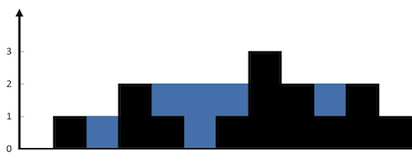Leetcode 42. Trapping Rain Water
Explanation for Leetcode 42 - Trapping Rain Water, and its solution in Python.
Problem
Leetcode 42 - Trapping Rain Water
Example:
1
2
3
4
5
6
Input: height = [0,1,0,2,1,0,1,3,2,1,2,1]
Output: 6
Explanation: The above elevation map (black section) is represented by array [0,1,0,2,1,0,1,3,2,1,2,1]. In this case, 6 units of rain water (blue section) are being trapped.
Input: height = [4,2,0,3,2,5]
Output: 9
Approach
We can use a 2 pointer and keeping track of max height of from left and right to solve this problem.
- if maxLeft < maxRight
- increment left pointer
- update maxLeft
- add maxLeft - height[left] to res
- else
- decrement right pointer
- update maxRight
- add maxRight - height[right] to res
Visualization of the Approach:
1
2
3
4
5
6
7
8
9
10
11
12
13
14
15
16
17
18
19
20
21
22
23
24
25
26
27
28
29
30
31
32
33
34
35
36
37
38
39
40
41
42
43
44
45
46
47
48
49
50
51
52
53
54
55
56
57
58
59
60
61
62
63
64
65
66
67
68
69
70
71
72
73
74
75
76
77
height = [0,1,0,2,1,0,1,3,2,1,2,1]
l r
maxLeft = 0
maxRight = 1
res = 0
Since maxLeft < maxRight
height = [0,1,0,2,1,0,1,3,2,1,2,1]
l r
maxLeft = 1
maxRight = 1
res = 0
Since maxLeft >= maxRight
height = [0,1,0,2,1,0,1,3,2,1,2,1]
l r
maxLeft = 1
maxRight = 2
res = 0
Since maxLeft < maxRight
height = [0,1,0,2,1,0,1,3,2,1,2,1]
l r
maxLeft = 1
maxRight = 2
res += 1-0 = 1
Since maxLeft < maxRight
height = [0,1,0,2,1,0,1,3,2,1,2,1]
l r
maxLeft = 2
maxRight = 2
res += 2-2 = 1
Since maxLeft >= maxRight
height = [0,1,0,2,1,0,1,3,2,1,2,1]
l r
maxLeft = 2
maxRight = 2
res += 2-1 = 2
Since maxLeft >= maxRight
height = [0,1,0,2,1,0,1,3,2,1,2,1]
l r
maxLeft = 2
maxRight = 2
res += 2-2 = 2
Since maxLeft >= maxRight
height = [0,1,0,2,1,0,1,3,2,1,2,1]
l r
maxLeft = 2
maxRight = 3
res += 3-3 = 2
Since maxLeft < maxRight
height = [0,1,0,2,1,0,1,3,2,1,2,1]
l r
maxLeft = 2
maxRight = 3
res += 2-1 = 3
Since maxLeft < maxRight
height = [0,1,0,2,1,0,1,3,2,1,2,1]
l r
maxLeft = 2
maxRight = 3
res += 2-0 = 5
Since maxLeft < maxRight
height = [0,1,0,2,1,0,1,3,2,1,2,1]
l r
maxLeft = 2
maxRight = 3
res += 2-1 = 6
Thus return 6
Here is the Python code for the solution:
1
2
3
4
5
6
7
8
9
10
11
12
13
14
15
16
17
18
19
20
class Solution:
def trap(self, height: List[int]) -> int:
if len(height) == 0:
return 0
res = 0
left, right = 0, len(height) - 1
maxLeft, maxRight = height[left], height[right]
while left < right:
if maxLeft < maxRight:
left += 1
maxLeft = max(maxLeft, height[left])
res += maxLeft - height[left]
else:
right -= 1
maxRight = max(maxRight, height[right])
res += maxRight - height[right]
return res
Time Complexity and Space Complexity
Time Complexity: $O(n)$
Space Complexity: $O(1)$
This post is licensed under CC BY 4.0 by the author.
